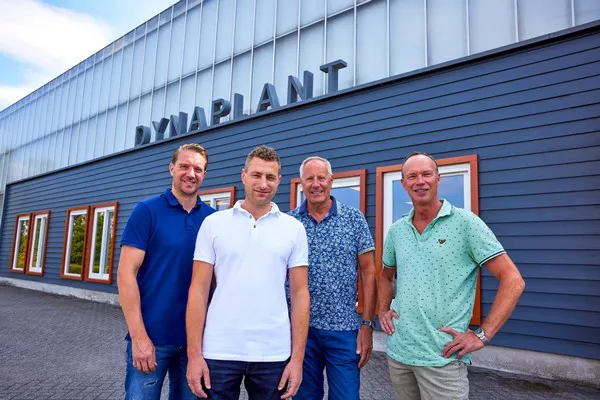After twenty years, a new generation makes its appearance at Dynaplant. Ruben van der Lugt and Dietrick Nagemaaijer continue what Martin van der Lugt and Peter Varekamp started. Martin who, as a potted plant grower, was looking for a new market and product. And Peter as a bell pepper grower who wanted blooming potted plants. Their 'corporate marriage' happened more or less coincidentally off-field during a korfball competition.

Left to right: Ruben van der Lugt, Dietrick Hanemaaijer, Martin van der Lugt, and Peter Varekamp
"We didn't know each other, but we both had kids playing korfball. During a competition in the summer of 2002, we got to talking," Peter says, looking back on the remarkable encounter in the following story of Alfa Accountants and Advisors.
The two growers found each other in blooming potted plants, and that first cultivation also came about in an unusual way. "Martin could take over the Clivia cultivation from a Belgian breeder, who was going to quit. Well, we had to start somewhere," Peter jokes.
Not long after, the next crop made its entrance: the Calla, also known by its fancy name Zantedeschia or Arum Lily. To this day, the beautiful potted plant of African descent aids in Dynaplant's success. "I believe we hold a market share of roughly 35 percent. Calla is a typical West European house plant. Ninety percent comes from The Netherlands. Together with another grower, we are the market leaders," says Peter.
Tricky cultivation
One reason they managed to hold this position is that the cultivation isn't easy. "It's tricky to cultivate on a technical level. Disease levels are high, and it isn't easy to get to the desired height. It's a cultivation that requires a lot of attention. In addition, the Calla's shelf life is relatively short. We mainly supply to retail, like supermarkets and construction stores, and prefer to have the plants in store on Tuesday and have them sell out by Friday. In a garden center, this circulation speed is lower."
'High energy prices affect us as well'
Contrary to many colleagues, Dynaplant doesn't have to jump through hoops to limit gas usage. "It's a relatively expensive cultivation. Therefore, the share in energy costs is already lower. Yet we are affected by the energy prices as well. If things remain this expensive, we are considering producing less in winter. We do have some underutilization then but avoid an expensive period. We meet our heating requirements for 30% through geothermics and possess a CHP. Heat isn't that expensive for us, but electricity for lighting is."
Four shareholders
From the initial two, from January 1st, 2022, Dynaplant has grown to a company with four shareholders. Ruben, son of Martin, joined on January 1st, 2017. "But for a single person, we believed the company of 7.5 hectares to be a bit too grand and complex. We thought it would be wise for him to find a second entrepreneur. From the Varekamp side, no one was interested. Eventually, it became Dietrick Hanemaaijer, who he knew well."
A hand on the wheel
Martin was responsible for the cultivation and technicalities, and Peter for sales, finances, and the cultivation schedule. The two founders moved to the sidelines. "Now and again, you get the urge to keep a hand on the wheel. But Ruben and Dietrick are now responsible for the daily management. If much has changed? It's clear that the new generation does more with ICT. Data analyses become more important to accuracy concerning color, availability, and labor. The process gets more digitized. The two guys are ambitious and clearly indicated they didn't want to continue business as usual. They want to expand and perhaps move towards a second main crop, to be less dependent on Calla."
Alfa's specialty
For the succession, accountancy firm Alfa had their role to play as well. "I was already there when Alfa was still called CBTB," says Peter. "For the fusion with Martin, we chose his accountancy firm. However, that went on to merge as well, and we believed it wasn't aimed towards horticulture enough. Alfa's specialty suits us better. For example, Alfa has in-depth knowledge of subsidiaries and acquisitions such as these, which differs from medium-sized and small companies. I'd rather have customer management that understands this."
A great example is Pals Kingma, senior customer manager at Alfa and the point of contact. "A process like this isn't hard, but you need to know what you want and when you will start. Appreciation for the company is important. And then the question: is only the exploitation being transferred or the real estate as well? We chose the latter. What does make it complex is that Martin transfers it to his son. In his case, it can include some goodwill while I'm transferring it to someone else. For this reason, we both chose to take a very corporate approach with Alfa."
 For more information:
For more information:
Alfa Accountants en Adviseurs
www.alfa.nl
